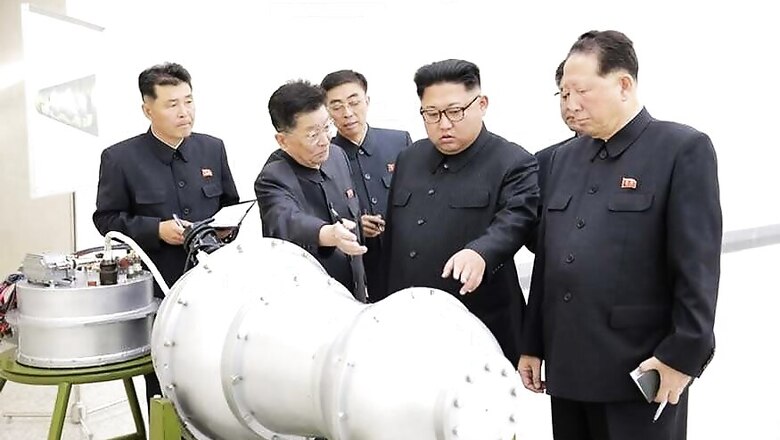
views
With the sixth nuclear tests on September 3, 2017, North Korea has reiterated its indomitable desire to take their nuclear weapon capacity up to an irreversible stage. The test reportedly had yield capacity of 100-250 kilotonnes and it was a thermonuclear device.
The six nuclear tests are not only special because of their yield capacity but also because of other technological sophistication. North Korea has consistently followed its nuclear ambitions and has been able to overcome most of the obstacles in the journey.
When regional dynamics is volatile for the ruling North Korean leader Kim Jong-un, nuclear weapons are considered to be the last guarantor of survival.
North Korea has learnt lessons from Iraq and Libya. In the case of Iraq, absence of weapons of mass destruction was the reason that made it possible for the US-led alliance to topple the Saddam Hussein government easily and Libya had to face consequences of giving up its nuclear weapons.
From the North Korean perspective, in an unsettled East Asian region, possession of nuclear weapons ensures that external players would not be able to intervene to realise their desire of ‘change of regime’.
To understand North Korea’s nuclear ambition, it is important to understand that North Korea is one of the divided countries and it faces threat from South Korea and the US alliance.
Until the mid-Cold War era, it reasonably matched South Korea’s military strength in conventional warfare. However, during the last few years of the Cold War, North Korea realised that it could not compete with South Korea in the conventional weapons domain. Its leadership thought that nuclear weapons could be the only option to bring deterrence in the inter-Korea dynamics.
Moreover, around the end of the Cold War, Pyongyang’s two important security allies — USSR and China — established diplomatic relations with South Korea. Pyongyang considered it abandoning of their commitment to the North Korean security.
North Korea had to take charge of its own security and nuclear weapons were considered to be a viable option in the changed milieu.
From the early 1990s, North Korea was not able to have economic exchanges and benefits, like it used to with the USSR, China and other East European socialist countries.
Its effect on North Korea economy was quite severe. North Korean economic situation worsened due to natural calamities such as flood and drought in the mid-1990s. Reports said that almost 2 million North Koreans starved to death, which was around 10 percent of North Korean population.
When the North Korean regime performed poorly on economic terms, the leadership decided to articulate and consolidate popular support by pursuance of nuclear weapon programme more aggressively. Thus, in a way North Korean nuclear ambition also become an instrument to acquire legitimacy for the ruling regime.
North Korea suffers from insufficiency of food, malnutrition, lack of liberal education, absence of almost all kind of freedom and so on. Thus, North Koreans are taught to take pride in their nuclear and missile programmes and the ruling regime tries to deflect attention from the problems.
Thus, nuclear ambitions of North Korea must be understood in the context of the threat from the South Korea-US alliance, sense of abandonment from the USSR and China, quest of survival of political regime, and source of domestic legitimacy.
Most of the time, the international community, under the leadership of the US, has not been able to recognise the complex dynamic of the North Korean nuclear ambitions. So, they have not been able to deal with the issue.
Contrary to public perception, whenever North Korean nuclear ambition was correctly understood and an informed policy was adopted, North Korean behaviour and posture have been moderate and encouraging.
IMPLICATIONS
North Korea’s nuclear ambitions may have a context or explanation from North Korean perspective but it has serious disruptive implications for the regional politics. It has brought the East Asia region at a short-fuse and any miscalculation may lead to actual nuclear conflict in the region with catastrophic consequences.
In recent years, on the issue of North Korea’s regular nuclear and missile tests, there has been sharp exchange of statements between Pyongyang and the Washington-Tokyo-Seoul alliance. Any of these activities have the capacity to transform into an actual conflict.
Another implication of the North Korean ambitions is that in and around the Korean peninsula, huge armament has taken place in recent years.
It’s now a real possibility that South Korea and Japan would also try to exercise their own nuclear ambitions. With Donald Trump coming to power in the US, South Korea and Japan can’t be sure about military aid from the US.
Actually, Trump has many times stated that both its allies should either take care of their own security or should pay for it. In the domestic politics of South Korea and Japan, already a sizeable number of people support their countries going nuclear. This possible nuclear arms race in the region would further destabilise it.
WAY FORWARD
It is urgent for the US, South Korea, Japan and other countries to think about a peaceful resolution. It’s too simplistic to blame North Korea for its nuclear ambitions. North Korean nuclear ambitions are based on the country’s desire for security and survival.
If the North Korean regime is ensured its security and survival through an empathic understanding and a process of engagement is initiated, North Korea might be brought to the negotiating table and a satisfactory resolution of the crisis could be arrived at.
However, putting pressure and economic sanctions on North Korea through bilateral mechanism and multilateral institutions are not going to be successful as North Korea is not quite dependent on its external economic exchanges, apart from China.
(Sandip Kumar Mishra is an Associate Professor at the Centre for East Asian Studies in Jawaharlal Nehru University. All views are personal.)

















Comments
0 comment